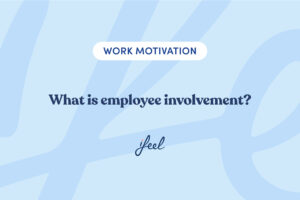The mental health stigma at work is, in a nutshell, the idea that mental health problems should be hidden in the work environment. This widely held belief is a huge challenge that many employees face every day, in disguise, when they go to work or look for a job.
In addition, the mental health stigma at work is a problem for organizations since it is an indicator of a bad working environment. In this sense, it implies that the company does not trust the abilities of an employee because they have a serious mental health problem, without specifying or contextualizing further. The employee, on the other hand, does not perceive the company as a safe space where they can openly express they have a health problem, regardless of the influence that such a problem may or may not have on their performance.
It is clear that, at the very least, the mental health stigma at work is the cause of serious corporate dysfunctions that end up affecting the last link in the chain: the company’s results and success.
Why is there a mental health stigma at work?
Stigma around mental health persists due to a lack of understanding and the presence of ingrained myths in society. Misinformation and stereotypes contribute to the fact that many people avoid seeking help, fearing judgement and discrimination.
How does stigma affect those struggling with mental health problems?
Stigma can have a significant impact on the daily lives of those struggling with mental health problems. It can make it difficult to seek support, accept one’s condition, and participate fully in society and the work environment.
How can we overcome a mental health stigma at work?
Overcoming stigma requires a collective effort. Promoting education and awareness about mental illness, sharing stories of overcoming stigma and promoting inclusive language are key steps. We all have a role in challenging misperceptions and building more supportive communities.
How to address the taboo surrounding mental health in the workplace?
In the workplace, it is essential to foster a culture that supports mental health. This includes promoting open conversations, providing mental wellness resources and programmes, and ensuring that company policies are inclusive and do not contribute to stigma.
The mental health stigma at work
1. Talking about my diagnosis at work
To refer to the mental health stigma at work we can do so in at least two ways. On the one hand, there are those people who suffer from a serious mental disorder, usually chronic (which can be treated but not cured), prior to their work situation. This is the case, for example, of people suffering from some form of schizophrenia, personality disorder, or bipolar disorder, among others. It may also be the case for those who have suffered it in the past (e.g., a major depressive episode that has already passed).
Even when these situations are properly diagnosed and treated, so that the person’s mental health is restored, is the current or future company a safe and trustworthy place to talk openly about it?
Normally it is not, and neither are other areas outside the workplace: mental disorders are usually accompanied by a great social stigma, so the company is no stranger to this phenomenon. This leads them to be very strictly silenced when it comes to work, especially if a selection or promotion process is at stake.

2. Having mental health problems due to the job
On the other hand, the mental health stigma at work alludes to the fact that the negative influence that the work environment has on our mental health is silenced: it is not good to say that our mental health suffers because of problems directly related to work, as we perceive that this detracts from our professionalism.
Therefore, classic problems such as anxiety, stress, profound demotivation, isolation, absenteeism, lack of recognition, or the consequences of harassment at work – circumstances that can cause enormous damage to our psychological well-being – are part of everything that must not be admitted if we want to thrive in the company.
Why is there a mental health stigma at work and how can we tackle it?
1. Vulnerability: an uncomfortable truth
There is a belief that a good employee is someone who has no vulnerabilities. That is to say, they can take whatever is thrown at them; there are no weak points where work can affect them. Regardless of their circumstances inside and outside of work, they are someone who does not succumb to fatigue, demotivation, excessive schedules, poorly shared responsibilities, pressure, multitasking, external demands, a competitive environment, threats, lack of recognition…
Nothing affects them. Therefore, a good employee does not go through rough patches, does not suffer crises or worries, is always clear-headed and rested, does not feel insecure about their abilities.
Or not, but they are convinced that admitting it, even in a contextualized and reasonable way, in front of their bosses and colleagues makes them look like a less qualified, less reliable employee. Someone whom the company would be better off without or whom the company would find it disadvantageous to hire.
That’s why it’s better to keep quiet and pretend that any way of working is good. As long as the body and mind can take it.
2. The law of silence
Hiding more or less serious mental health problems in order to protect one’s reputation and image contributes to the invisibility of the issue and, therefore, to the fact that it is not considered a real problem: “In this company, such things do not happen, everything is fine here, fortunately, we do not have this problem”.
This is the first step towards not taking measures aimed at preventing and addressing problems related to mental health at work and perpetuating the widespread but never shared out the loud belief that mental health problems are a risk to professional development that we must manage on our own.
3. Facing stigma, a shared responsibility
Fortunately, more and more people and companies are realizing that the philosophy of looking the other way and forcing the performance of employees, indiscriminately singling them out at the slightest sign that their mental health is suffering, is being called into question.
As a result, everyone is finding a balance between the necessary self-care and the care that the company can provide to its employees through a specific strategy for the protection of psychological well-being, based on a friendly, open, and respectful corporate culture.
The following table shows the actions companies can take to help battle mental health stigma at work, and the positive consequences this can have on employees’ mental well-being.
| Action | Consequence |
|---|---|
| 1. Implement Mental Health Education | – Increased awareness and understanding of mental health issues among employees. – Reduction in misconceptions and stereotypes. – Empowerment to recognize and support colleagues facing mental health challenges. |
| 2. Promote Open Communication | – Encourages employees to share their experiences without fear of judgment. – Fosters a supportive environment where individuals feel comfortable seeking help. – Leads to increased trust and stronger team bonds. |
| 3. Establish Mental Health Policies | – Clear guidelines and procedures for addressing mental health concerns. – Signals organizational commitment to supporting employees’ well-being. – Provides frameworks for accommodations and resources. |
| 4. Train Managers on Mental Health Support | – Equips managers with skills to recognize signs of distress in team members. – Enables timely and appropriate interventions to support struggling employees. – Reduces the likelihood of discriminatory behaviors or responses. |
| 5. Offer Employee Assistance Programs (EAPs) | – Provides confidential access to counseling and support services. – Helps employees navigate personal and work-related challenges affecting mental health. – Demonstrates organizational investment in employees’ mental well-being. |
| 6. Foster a Culture of Work-Life Balance | – Emphasizes the importance of maintaining boundaries between work and personal life. – Reduces burnout and stress, which can exacerbate mental health issues. – Encourages self-care practices and prioritizing mental well-being. |
| 7. Celebrate Diversity and Inclusion | – Embraces diverse perspectives and experiences, including those related to mental health. – Creates a sense of belonging for all employees, regardless of their mental health status. – Counteracts stigma by promoting acceptance and understanding. |
| 8. Conduct Anonymous Surveys | – Provides insights into the prevalence of mental health challenges within the workforce. – Identifies areas for improvement in mental health support initiatives. – Allows for feedback without fear of repercussions, encouraging honesty. |
| 9. Implement Zero-Tolerance Policies | – Sends a clear message that discrimination or harassment based on mental health is unacceptable. – Creates a safer and more inclusive work environment. – Holds individuals and the organization accountable for fostering a stigma-free workplace. |
Having these actions in place is key to tackling the mental health stigma at work. Moreover, they should all be backed by having a mental well-being solution in place. This way, employees can access different tools and resources to help manage their mental health, as well as one-to-one therapy for those who need it. In addition, having such programmes can also help managers understand how to detect these problems and prevent them.

Join the global leading solution in mental well-being
Mental well-being for companies
At ifeel, we understand that it is not possible to take care of the company without taking care of the psychological well-being of its employees. To do so, we have a mental well-being solution for companies, designed by our team of occupational well-being psychologists with one main objective: to help companies place employee health at the center of their strategy to build their mission statement.
Thanks to this partnership, the people in charge of HR departments can receive personalized, data-driven advice on how to make good decisions in a company to get the most out of the teams they are in charge of and take better care of the psychological well-being of the people in them.
Moreover, this program offers employees a holistic mental health care service structured at different levels according to their needs. This service includes, if required, online psychological therapy with a psychologist specialized in cases like theirs. Try our program today so you can see how it could help you.
We hope you have found this post about the mental health stigma at work useful. If you want more information about our mental well-being solution for companies, simply request it and we will contact your team as soon as possible. You may also be interested in this post about mental health at work.













